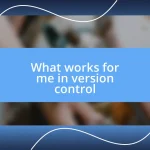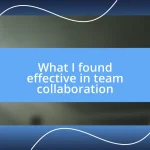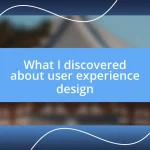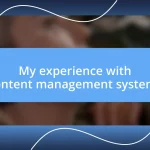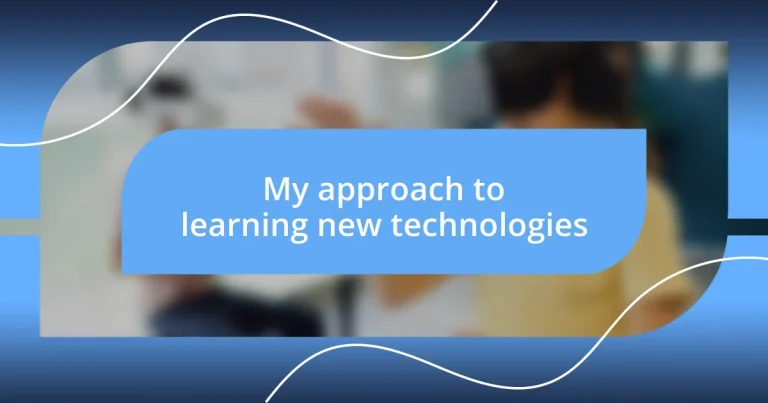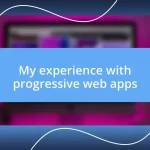Key takeaways:
- Understanding personal learning styles enhances the grasp of new technologies; hands-on experiences and visual aids are particularly beneficial.
- Setting clear and specific learning goals, along with regular progress tracking and reflections, transforms overwhelming tasks into manageable milestones.
- Engaging in practical projects and leveraging online resources and communities fosters deeper understanding, collaboration, and resilience in learning experiences.
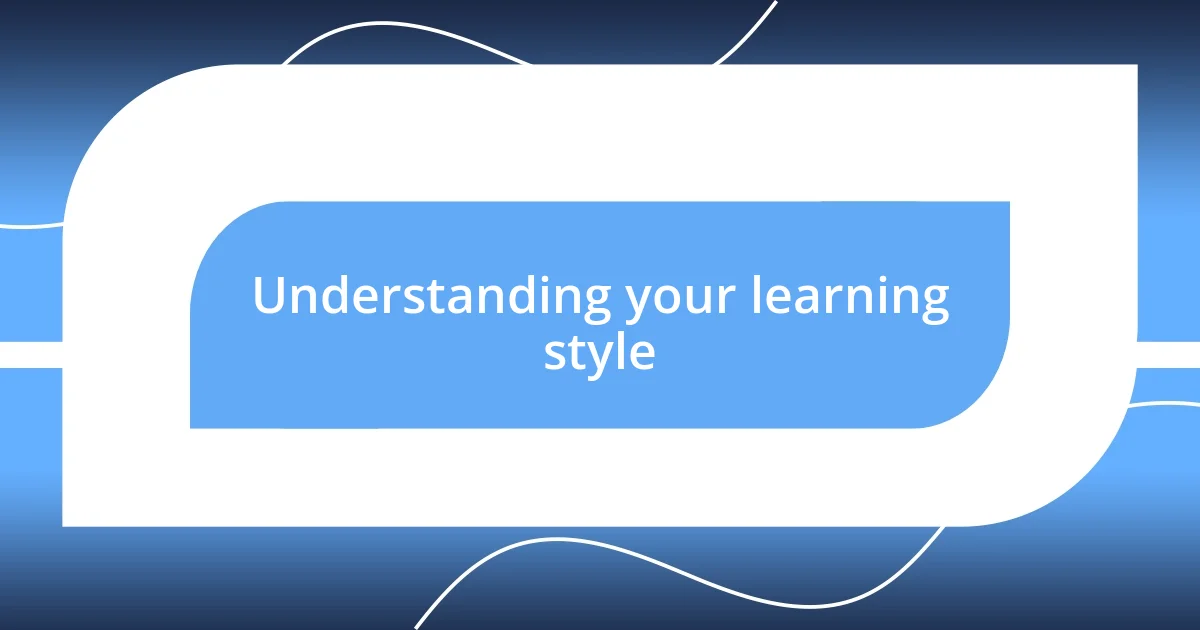
Understanding your learning style
Understanding your learning style is essential for effectively grasping new technologies. Personally, I found that I thrive when I can apply what I learn in real-world scenarios. For instance, when I was learning a new programming language, I couldn’t just read about it; I had to dive in, building small projects to see the concepts in action. Have you ever noticed how hands-on experiences can solidify your understanding?
I often reflect on how visual learning has shaped my approach. I remember attending a complex seminar on data analysis where the instructor used infographics to illustrate key points. That visual element clicked for me, turning abstract ideas into concrete images. What about you? How much value do you place on visual aids when trying to learn something new?
It’s intriguing how our preferences can guide our learning journeys. I’ve seen friends who are auditory learners benefit from listening to podcasts or attending webinars. Meanwhile, I gravitate towards interactive tutorials and quizzes. Understanding your style not only enhances your learning experience but also sets a foundation for mastering technologies that may initially seem daunting. What strategies have you found most effective in identifying your learning style?
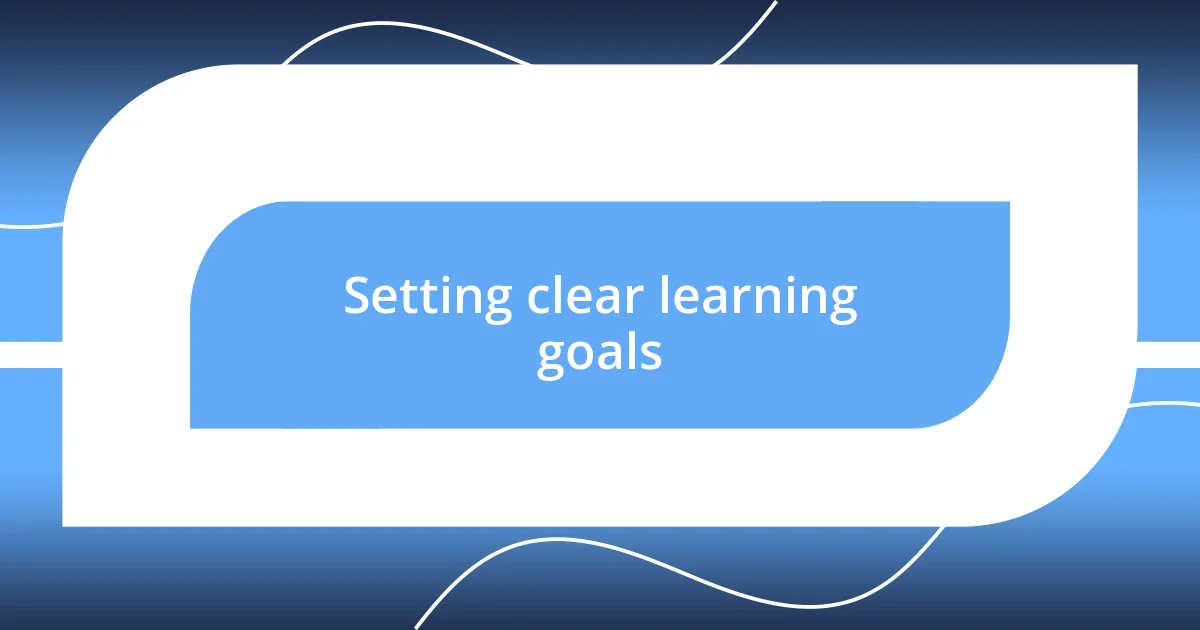
Setting clear learning goals
Setting clear learning goals is a vital step in my approach to mastering new technologies. When I embarked on learning machine learning, I realized it wasn’t enough to just say, “I want to learn this topic.” Instead, I broke it down into specific objectives, like completing an online course or building a simple predictive model. This clarity transformed the overwhelming sea of information into manageable tasks. Have you ever set a vague goal and then wondered where to start?
For me, even small milestones can create a sense of achievement and motivation. I recall when I decided to learn HTML and CSS; my first goal was simply to create a personal webpage. When I accomplished that, it sparked excitement and urged me to tackle more complex aspects. It’s amazing how little victories can fuel our desire to learn more. What initial achievements push you further in your learning?
I also believe it’s important to revisit these goals periodically. When I worked towards mastering data visualization tools, I would assess my progress every month. This reflection allowed me to adjust my approach if needed and celebrate my growth along the way. Setting, tracking, and refining my goals keeps me engaged in the learning process. How often do you check in with your own learning objectives?
| Goal Type | Description |
|---|---|
| Short-term Goals | Specific, actionable steps toward learning. |
| Medium-term Goals | Milestones that mark progress over a few months. |
| Long-term Goals | Overall objective achieved over an extended period. |
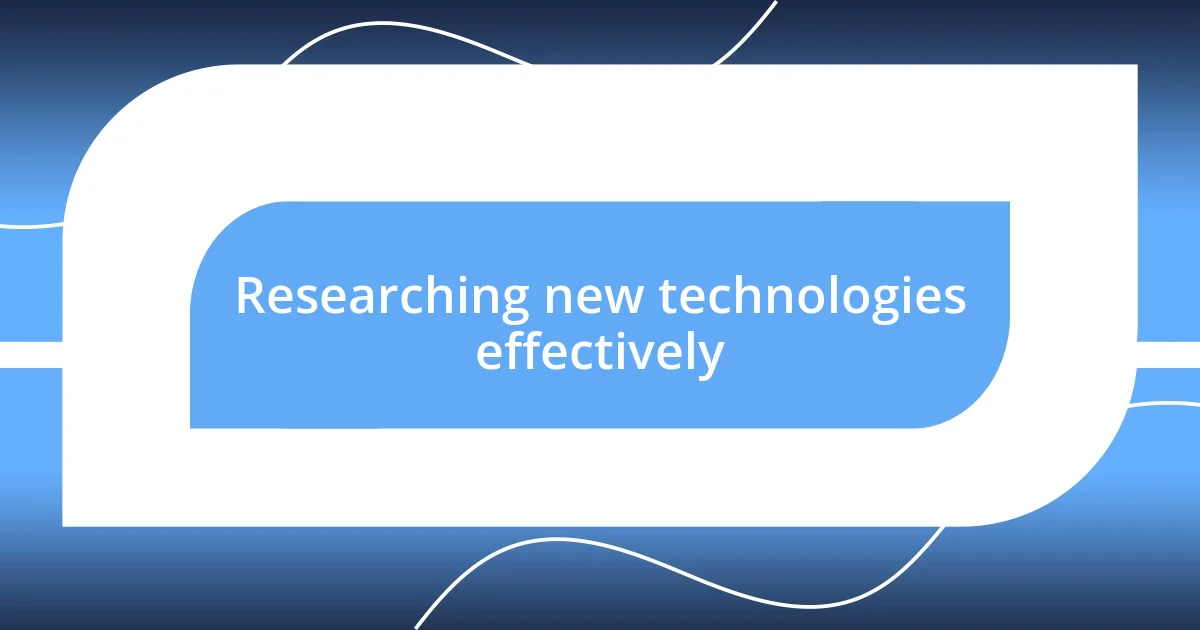
Researching new technologies effectively
Researching new technologies effectively is a skill that evolves with experience. I remember my first encounter with blockchain technology; it felt like trying to read a foreign language. I spent hours sifting through articles, tutorials, and videos. However, I quickly learned that focusing on a few reputable sources made a significant difference. I began prioritizing content from industry experts and established platforms. That shift allowed me to build a deeper understanding without getting lost in the noise.
Here’s how I approach my research:
- Identify Reliable Sources: Look for well-respected blogs, tech journals, or official documentation.
- Follow Industry Leaders: On social media and professional networks, follow experts who discuss emerging technologies.
- Engage with Community: Participating in forums or discussion groups helps me gain different perspectives.
- Experiment with Tools: Using hands-on trials of new technologies solidifies my understanding.
- Stay Updated: Subscribe to newsletters or podcasts that regularly cover technological advancements, keeping me informed.
From my experience, it’s not just about consuming information but also about finding ways to digest and interact with it, which ultimately enhances my learning. The connections I’ve made through research have often pointed me toward unexpected opportunities and insights, making the effort feel truly rewarding.
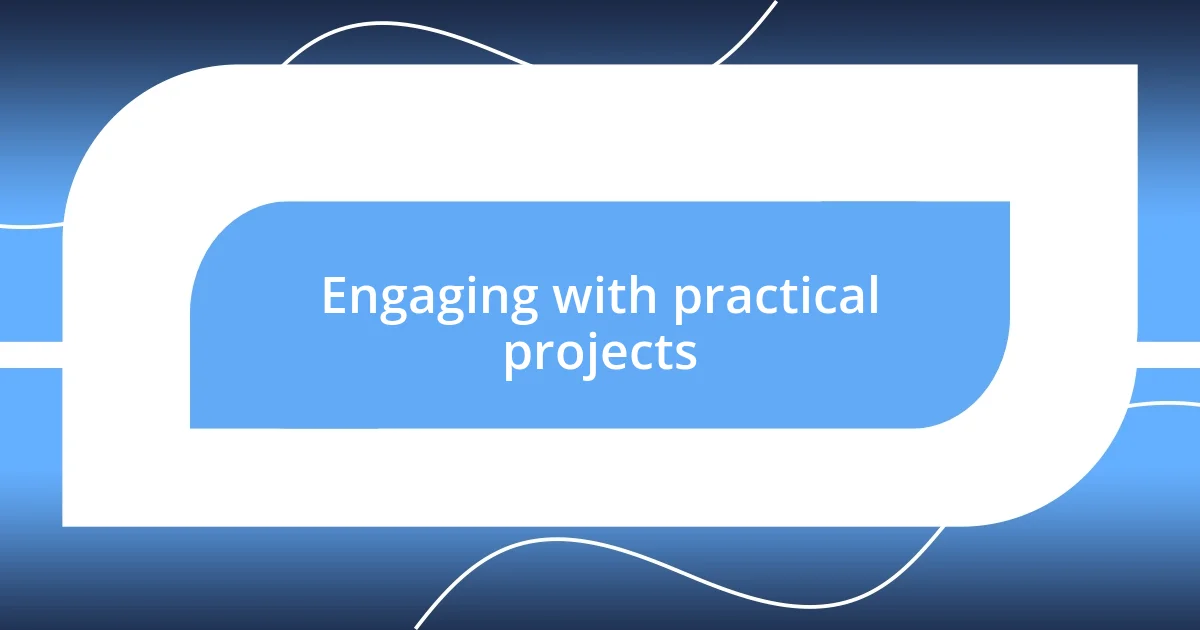
Engaging with practical projects
Engaging with practical projects has been an essential part of my learning journey. I remember diving into a robotics project where I built a simple automated plant watering system. Initially, it seemed daunting, but actually assembling the components made the theoretical aspects of coding and electronics click for me. Have you ever felt that rush when you see your project come to life? It’s a feeling that’s hard to replicate elsewhere.
Another significant experience was when I participated in a hackathon. The challenge pushed me to apply my skills on the spot while collaborating with others. Designing and coding a solution in a limited timeframe taught me not just the technology, but also how to work under pressure and adapt on the fly. I still reflect on how empowering it was to create something functional so quickly—how have teamwork and time constraints influenced your projects?
Practical projects also give me the chance to learn from failure. I once attempted to develop a mobile app that didn’t work as expected, which was extremely frustrating. However, I took that experience to reflect on what went wrong, and it became a powerful learning opportunity. Each setback ultimately refined my approach, reinforcing the idea that failures can pave the way for success. How do you handle setbacks in your learning projects? Embracing them can open doors to deeper understanding and skill mastery.
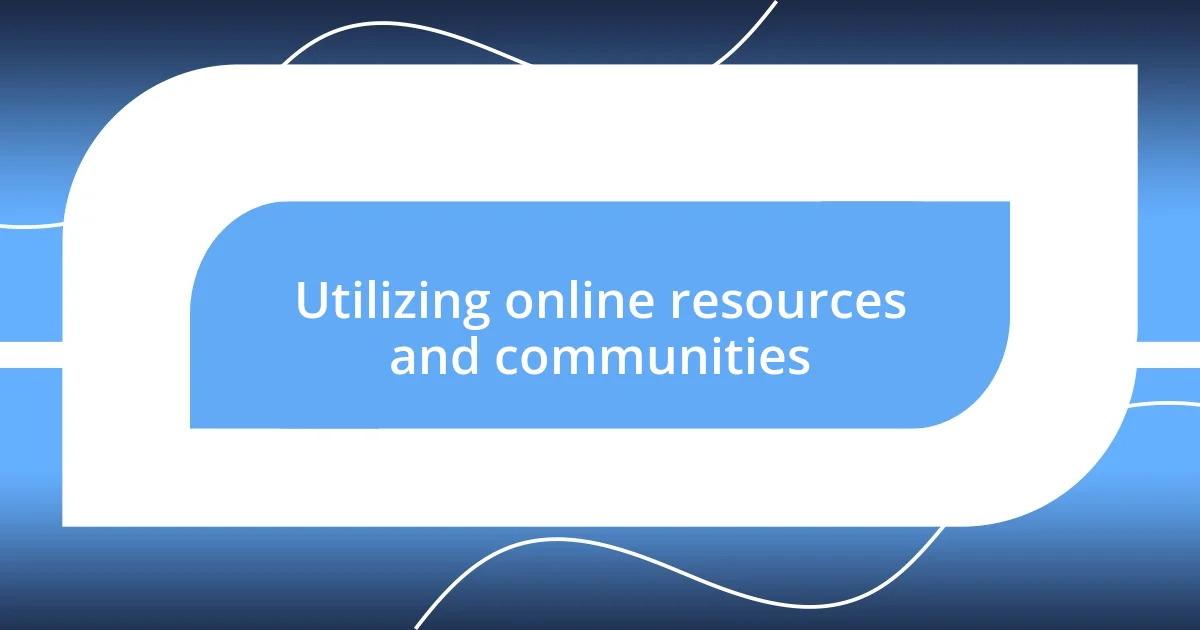
Utilizing online resources and communities
Online resources and communities have transformed the way I learn new technologies. I remember the first time I stumbled upon a programming forum; it felt like a treasure trove of knowledge. Engaging with peers who were all eager to share their insights and experiences created an environment where I could freely ask questions and clarify doubts. Have you ever found yourself lost in a discussion thread, only to discover a gem of information that really clicked? I know I have, and it often felt like I was connecting dots that I didn’t even know existed.
Another valuable experience came when I joined an online coding bootcamp. The camaraderie built through shared challenges fostered not just learning, but lasting friendships. We would support each other during problem-solving sessions, and those late-night coding marathons became a vibrant part of my learning journey. Can you recall a moment when community support made all the difference for you? Having a network to lean on made even the most complex concepts manageable.
Additionally, I’ve found that participating in online tech meetups or webinars is a game-changer. I attended one that focused on cloud computing, and listening to industry leaders discuss their real-world experiences was inspiring. Their stories resonated with me, as they often shared setbacks that led to breakthroughs. It made me realize that learning isn’t a linear path. How do you feel when you see successful figures admit their failures? Personally, it reassures me that growth happens through resilience and adaptability.
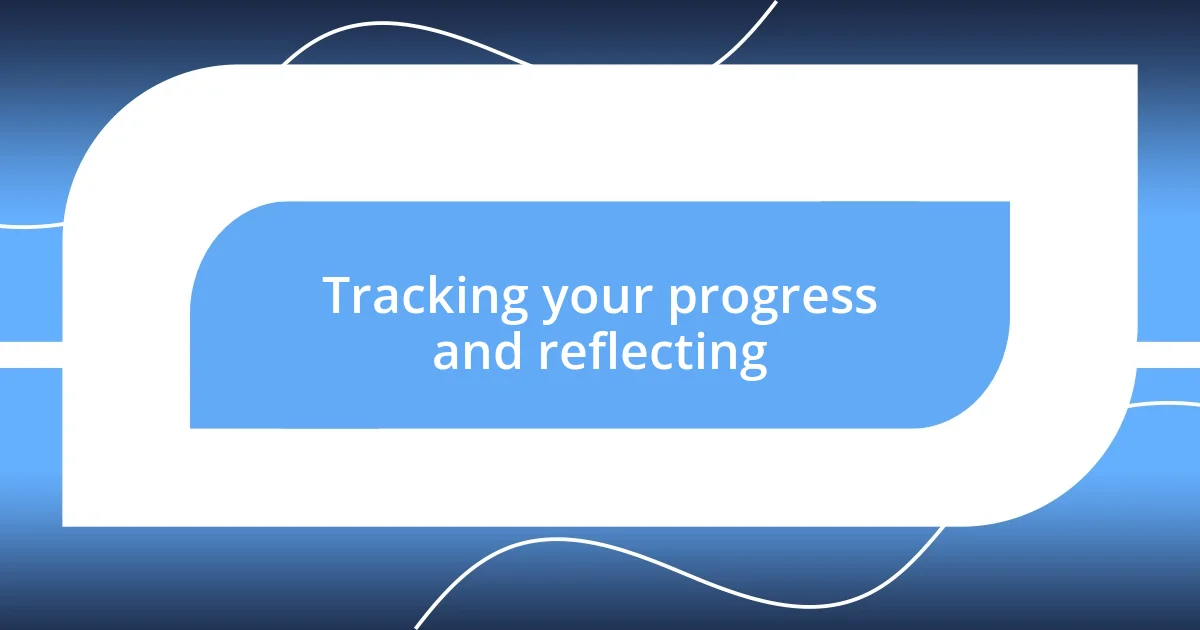
Tracking your progress and reflecting
Tracking your progress and reflecting on your learning experience is fundamental to mastering new technologies. Personally, I keep a journal where I note down my daily learning objectives and accomplishments. Reviewing my entries shows me how far I’ve come, which sometimes surprises me! Have you ever taken a moment to look back at your progress and felt a sense of pride?
There was a time when I was learning a new programming language, and I hit a wall. Instead of pushing through aimlessly, I decided to pause and reflect. By analyzing what specifically was challenging for me, I realized I hadn’t fully grasped the foundational concepts. This reflection not only helped me overcome that hurdle but also reinforced the knowledge I already had. Have you found that stepping back can lead to breakthroughs?
I also like to set regular checkpoints in my learning journey, especially after completing significant milestones. For example, after a major project, I gather feedback from peers and mentors and take notes on what worked and what didn’t. This feedback loop challenges me to constantly improve and adapt my approach. How often do you seek outside perspectives on your work? Embracing feedback can be a powerful driver for growth!
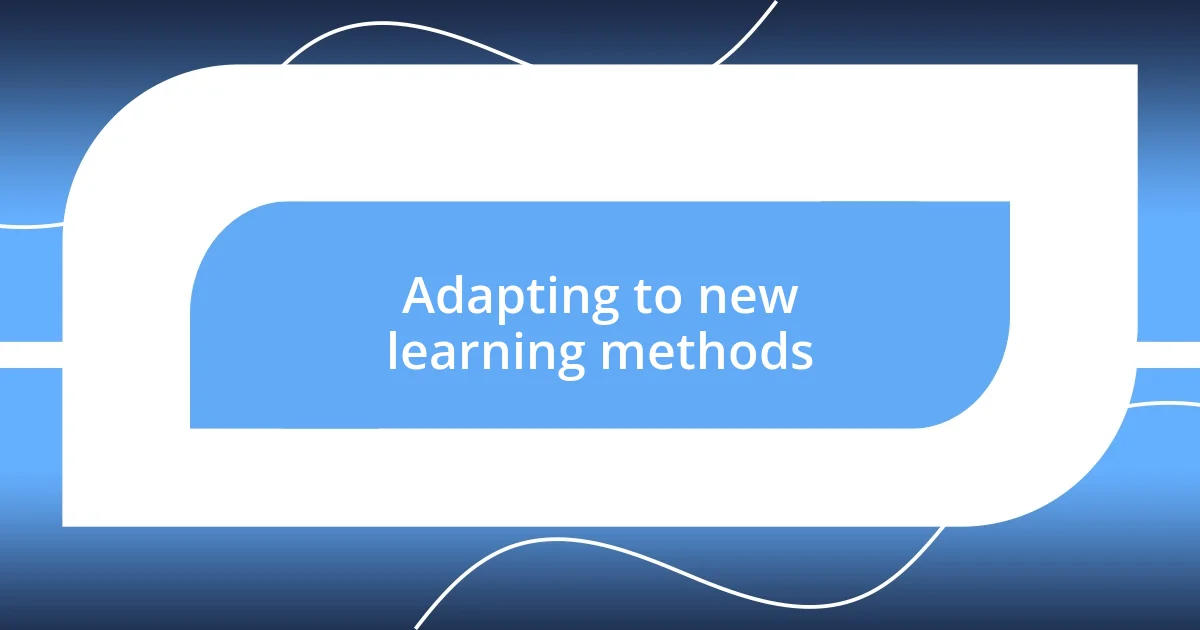
Adapting to new learning methods
Adapting to different learning methods has been a transformative part of my approach. I remember when I first tried a visual learning technique by creating mind maps. It felt like I was painting my thoughts rather than just writing them down. The colors and connections helped me visualize complex ideas, making them easier to remember. Have you ever experimented with a method that just clicked for you? Finding the right technique can make all the difference in understanding new material.
I’ve also experimented with hands-on learning, particularly when diving into hardware technologies. I recall building my first Raspberry Pi project. Getting my hands dirty with circuits and coding was like solving a puzzle; each piece had to fit just right. That tactile experience deepened my understanding in a way that textbooks simply couldn’t. Can you think of a moment when hands-on experience altered your perception of a topic? Those practical applications often bring theory to life.
Lastly, embracing adaptive learning platforms has changed how I approach technology education. I once enrolled in a course that adjusted its content based on my performance. It was fascinating since I could advance through material I was comfortable with, while spending more time on concepts I struggled with. This personalized approach not only kept me engaged but also motivated me to push my limits. How do you feel about learning environments that adjust to your needs? For me, it’s exhilarating to know that my learning journey can be uniquely tailored to my strengths and challenges.
